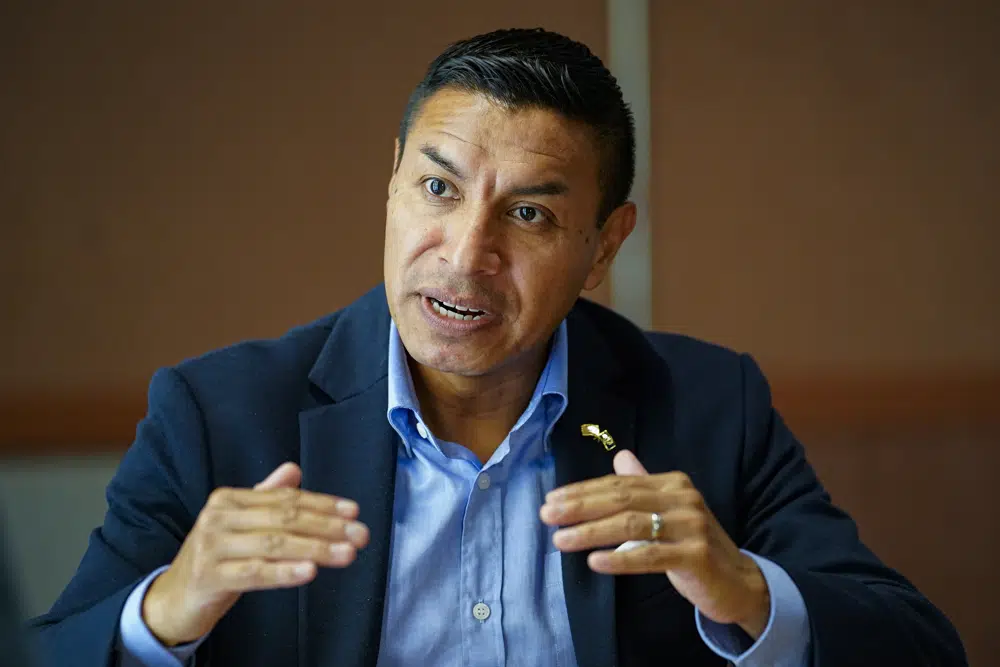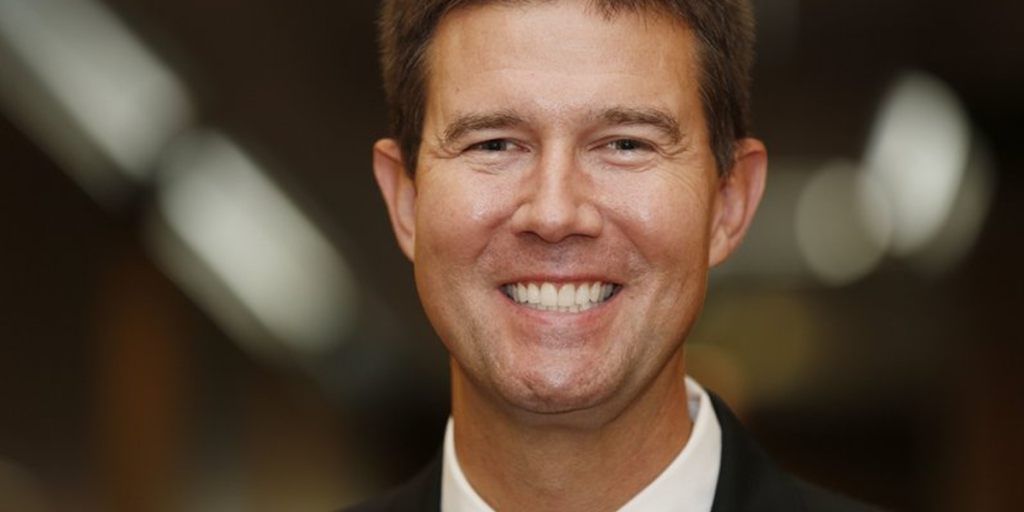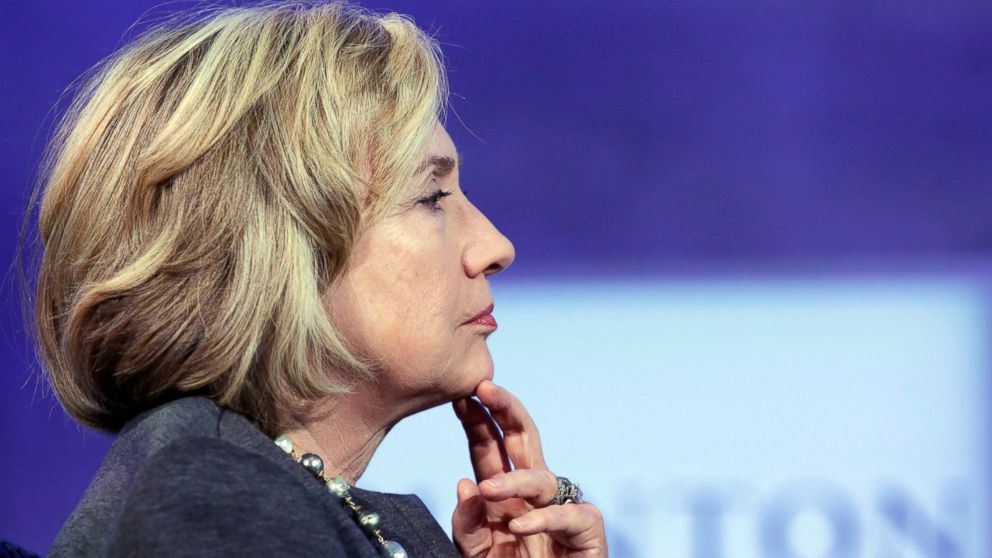Election skeptics slow to get sweeping changes in GOP states

Republicans in some heavily conservative states won their campaigns for secretary of state last year after claiming they would make sweeping changes aimed at keeping fraud out of elections. So far, their efforts to make good on their promises are mixed, in some cases because their rhetoric has bumped up against skepticism from members of their own party. Voters in politically pivotal swing states such as Arizona, Michigan, and Nevada rejected candidates seeking to oversee elections who had echoed former President Donald Trump’s false claims about the 2020 presidential election. But newly elected secretaries of state in Alabama, Indiana, and Wyoming who had questioned the legitimacy of that election won easily in those Republican-dominated states. They are now facing the task of backing up their campaign pledges in states where Republicans have already set strict election laws. In Indiana, Secretary of State Diego Morales has been relatively quiet. He has not been making the rounds at the Statehouse trying to persuade lawmakers to embrace the wide-ranging tightening of voting rules he promoted as a candidate. After defeating the incumbent secretary of state for the Republican nomination last summer, Morales dialed back his description of Joe Biden’s 2020 presidential election as a “scam” and his calls for tighter voting laws. That push included cutting Indiana’s 28-day early voting period in half and requiring new voters to prove their U.S. citizenship when registering. No bills for such steps were introduced for this year’s legislative session. Morales, who was an aide to Mike Pence when the former vice president was governor, also did not seek any money in his budget request to lawmakers for creating an “election task force,” which he had discussed as a candidate, that would investigate voting “shenanigans” around the state. A concept backed by Morales for requiring voters to include a copy of their driver’s license with a mail-in ballot application is being sponsored by a Republican lawmaker, but he said he wasn’t working with Morales on the proposal. Morales’ office has declined interview requests from The Associated Press since he took office on January 1. Kegan Prentice, the office’s legislative director, said Morales was “currently focused on the ongoing transition.” During remarks at an early January inaugural ceremony, Morales continued his campaign theme of promoting “election integrity” without giving specifics. “My priority is to make Indiana a national model for election confidence and integrity,” he said. Indiana House Speaker Todd Huston, also a Republican, said recently he had talked with Morales and told him he was “comfortable” with the state’s election laws. “I think our election laws are as good as any in the country,” Huston said. Morales was among the otherwise unsuccessful candidates associated with the America First Secretary of State Coalition, which called for large-scale changes to elections with candidates aligned with Trump’s views. The group supported losing candidates in several battleground states. They claimed widespread fraud and manipulation of voting machines, but there has been no evidence of either as exhaustive reviews in states lost by Trump have not revealed wrongdoing. That hasn’t stopped Republican candidates, particularly in contested primaries, from parroting the false claims that have taken hold among the party’s supporters. A large segment of Republicans, 58%, still believe Biden’s 2020 victory was not legitimate, according to an October poll by The Associated Press-NORC Center for Public Affairs Research. While Alabama’s Wes Allen and Wyoming’s Chuck Gray were not on the America First coalition’s candidate list, they also raised doubts about the 2020 vote. Allen repeated a debunked claim calling the 31-state Electronic Registration Information Center organization a “Soros-funded, leftist group,” a reference to liberal billionaire George Soros. The voter registration data-sharing partnership is designed to maintain accurate voter rolls by identifying people who have moved or died. It’s funded by states after receiving initial startup support from The Pew Charitable Trusts. Allen’s first official act was to withdraw Alabama from the group, citing privacy concerns. Indiana and Wyoming weren’t part of the organization. Even though Wyoming gave Trump his widest victory margins in 2016 and 2020, Gray’s election denials worried some of his fellow Republicans. The former state legislator and right-wing radio host often showed “2000 Mules,” a film that made unsubstantiated claims about ballot fraud, during his campaign events last year. He solidly beat a fellow Republican lawmaker who said the 2020 presidential outcome wasn’t in doubt. A few Republicans questioned whether Gray should be stripped of his election oversight role given his views, but that idea has received little support. Instead, he has received a warm welcome from Wyoming lawmakers considering several election bills that are moving ahead. One would prohibit “ballot harvesting,” or gathering others’ completed ballots for delivery, while another would implement new requirements for voting machines that would, in part, ensure they could not be connected to the internet. But so far, there is no legislation to follow through on Gray’s campaign proposals to ban ballot drop boxes or electronic voting machines, which despite mainly paper balloting in Wyoming, are available in every county to help voters with disabilities. That reflects the reality of trying to implement the most far-reaching election campaign promises in a heavily Republican state. In January, Gov. Mark Gordon made a point in his state of the state speech of saying that Wyoming counts on election integrity because of its “professional and dedicated” county clerks. But going off-script, Gordon hinted at Gray’s challenges ahead: “And I’m thrilled that our secretary of state takes that charge very seriously.” Republished with the permission of The Associated Press.
John Merrill: Response to Representative Wes Allen on ERIC Membership

In his recent electronic posting, Representative Wes Allen (R-Troy) falsely claimed that the Electronic Registration Information Center (ERIC) is a “Soros-funded, leftist group.” Both assertions are patently false, and they show a lack of understanding about how the elections process works in our state. First and foremost, ERIC was not founded nor funded by George Soros, and to claim otherwise is either dishonest or misinformed. ERIC was founded by the original seven-member states: Colorado, Delaware, Maryland, Nevada, Utah, Virginia, and Washington with the assistance of Pew Charitable Trusts. Also, ERIC’s operating costs are funded completely by annual dues paid by member states, not by George Soros. In 2015, the legislature passed Act 2015-459, which authorized “the Secretary of State to enter into agreements to share information with other states in order to maintain the statewide voter registration database.” I asked a freshman legislator with great promise to carry this bill for our office, and it was his first piece of meaningful legislation. That freshman legislator was Lieutenant Governor Will Ainsworth. In 2016, Alabama was certified to join ERIC. Also, it is important to note that currently, ERIC is the only organization capable of providing the necessary data for proper voter list maintenance. In Alabama, ERIC is used to preserve a clean and accurate voter list and to contact eligible residents who are not registered voters. Each month, we provide ERIC with a voters list and driver’s license data, and we receive information from ERIC for voter list maintenance in return. Monthly, our office receives a list of voter records that potentially need to be removed or inactivated based on deceased records from the Social Security Administration, potential duplicate voter records in Alabama, or voters that have potentially moved out of the state. Since joining the program in 2016, ERIC has identified more than 19,000 voter records of potentially deceased Alabama voters that died in this state or another ERIC member state. 98% of those voter records are no longer on the Alabama voter rolls. ERIC identified more than 222,000 voter records of potential cross-state movers from voter lists and driver’s license information obtained from other ERIC member states. 90% of those identified voter records are either no longer on the Alabama voter rolls or have been placed on a path to be removed in accordance with federal law. ERIC identified more than 24,000 voter records of potential duplicate registered voters in which an Alabama voter had duplicate records with potential inaccurate data. ERIC helped us match these voter records, and 95% of those duplicate records are no longer on the Alabama voter rolls. Annually, our office receives a list of individuals that have received a driver’s license or non-driver’s identification card and are not registered voters. Once a year, we reach out to all eligible individuals via a postcard that contains information on how to register to vote. Every two years, with data from ERIC, we perform a voter participation review to determine whether individuals potentially voted more than once in Alabama or voted once in Alabama and once in another state for the same election. These election security measures would not be possible without our partnership with ERIC. Our office does not have direct access to other states’ voter databases or driver’s license records. ERIC does. Our office does not have the authority or capability to securely store other states’ information. ERIC does. Our office does not have the certification and license requirement to access the Social Security Administration Death Master Index. ERIC does. Finally, neither the Alabama Law Enforcement Agency nor our office have the ability to compare driver’s license records for our state with other states for the purpose of voter list maintenance. ERIC does. ERIC has helped us to remove more than 1,350,000 ineligible voters from the rolls in the last six years. If elected as Secretary of State, how would Representative Wes Allen ensure that voters who have moved or have passed away are purged from our voters’ list without the necessary data that ERIC provides? By leaving ERIC for cheap political points, Representative Allen could undermine the election security measures that have made Alabama the gold standard for election integrity throughout the nation. Another flagrant mischaracterization by Representative Allen is the assertion that Alabamians’ information is transmitted to nefarious actors. This could not be further from the truth. ERIC’s membership agreement strictly prohibits them from selling, sharing, or disclosing Alabama’s data to any person, party, organization, or group. Also, the data is protected under the Federal Driver’s Privacy Protection Act (DPPA), and the data is not public record. Representative Allen has been rather quick to demand that Alabama end its relationship with ERIC. Hopefully, he will also be timely in outlining how he would end our relationship with ERIC while simultaneously maintaining election security without access to the necessary data, legal authority, or capability to conduct proper voter list maintenance. The State of Alabama could spend tens of millions of taxpayer dollars on a recurring annual basis and still not be able to provide the same level of services. While I am still Secretary of State, we will always choose election integrity, security, accountability, and transparency, along with sound and responsible financial decision-making over scoring cheap political points and to continue to ensure that it is easy to vote and hard to cheat. Let’s hope whomever the voters of Alabama elect to succeed me will do the same. John Merrill is currently serving as Alabama’s 53rd secretary of state.
Data: Nearly five dozen given a third of all 2016 campaign cash

It took Ted Cruz three months to raise $10 million for his campaign for president, a springtime sprint of $1,000-per-plate dinners, hundreds of handshakes and a stream of emails asking supporters to chip in a few bucks. One check, from one donor, topped those results. New York hedge fund magnate Robert Mercer‘s $11 million gift to a group backing the Texas Republican’s White House bid put him atop a tiny group of millionaires and billionaires whose contributions already dwarf those made by the tens of thousands of people who have given to their favorite presidential candidate. An Associated Press analysis of fundraising reports filed with federal regulators through Friday found that nearly 60 donations of a million dollars or more accounted for about a third of the more than $380 million brought in so far for the 2016 presidential election. Donors who gave at least $100,000 account for about half of all donations so far to candidates’ presidential committees and the super PACs that support them. The review covered contributions to outside groups that can accept checks of any size, known as super PACs, and to the formal campaigns, which are limited to accepting no more than $2,700 per donor. The tally includes donations from individuals, corporations and other organizations reflected in data filed with the Federal Election Commission as of Friday, the deadline for super PACs to report for the first six months of the year. That concentration of money from a small group of wealthy donors builds on a trend that began in 2012, the first presidential contest after a series of court rulings and regulatory steps that created the super PAC. They can openly support candidates but may not directly coordinate their actions with their campaigns. “We have never seen an election like this, in which the wealthiest people in America are dominating the financing of the presidential election and as a consequence are creating enormous debts and obligations from the candidates who are receiving this financial support,” said Fred Wertheimer, president of Democracy 21, a Washington-based group that wants to limit money in politics. Others see an upside to the rainmakers. “Big money gives us more competitive elections by helping many more candidates spread their message,” said David Keating, director of the Center for Competitive Politics, which advocates for fewer campaign finance limits. For any number of reasons, these donors are willing to give so generously. Some may have a business that stands to gain from an executive branch that changes how an industry is regulated, while others hope for plum administration assignments, such as a diplomatic post overseas or a cabinet position. Many say their contributions, which the U.S. Supreme Court has recognized as equivalent to free speech, merely reflect their intense belief in a particular candidate – and in the political system in general. “I’d think that the fact that I’m willing to spend money in the public square rather than buying myself a toy would be considered a good thing,” said Scott Banister, a Silicon Valley investor who gave $1.2 million to a super PAC helping Kentucky Sen. Rand Paul in the Republican presidential race. “The voters still, at the end of the day, make the decision,” he said. “You can spend $1 billion trying to tell the voters to vote for a set of ideas they don’t like, and they will still vote against the candidate.” For Florida developer Al Hoffman, financial support of the state’s former governor, Jeb Bush, is personal. A longtime friend and political contributor to the Bush family, he gave $1 million to Bush’s super PAC, contributing to its record-setting haul of $103 million in the first six months of the year. Hoffman was ambassador to Portugal during former President George W. Bush‘s second term. He said he sometimes offered Bush advice during his time as Florida’s governor, but doesn’t expect to influence a Jeb Bush administration. “I’d just like to see one,” he said. While the existence of high-dollar donors is more pronounced on the Republican side, they’re also among those giving to the super PAC backing Democratic front-runner Hillary Rodham Clinton. Seven donors of at least a million dollars accounted for almost half of the total collected by Priorities USA Action. Entertainment mogul Haim Saban and his wife, Cheryl, led with a $2 million gift, and hedge-fund billionaire George Soros, historically one of the Democratic Party’s biggest givers, donated $1 million. But no one has capitalized on the new era of big money like Bush. After announcing plans to explore a presidential run in December, Bush embarked on a nearly seven-day-a-week travel schedule to raise money for his Right to Rise super PAC. Bush navigated limits on how candidates can raise money for super PACs by playing coy about his intentions. Now that he is officially a candidate, he has left Right to Rise in the hands of his trusted strategist and friend, Mike Murphy. He’s not alone in the use of super PACs to fuel a presidential run. New Jersey Gov. Chris Christie and Wisconsin Gov. Scott Walker are too new to the presidential contest, announcing only weeks ago, to have filed any reports about their campaigns’ finances. Yet super PACs that sprang up months ago to support them show their efforts will be financially viable: A group backing Christie raised $11 million, while two supporting Walker brought in $26 million. Such totals put them well ahead of Paul, former technology executive Carly Fiorina, former Arkansas Gov. Mike Huckabee and former Sen. Rick Santorum – who all began their presidential campaigns in the spring. Cruz’s super PACs, meanwhile, didn’t just get the $11 million from Mercer. They also received a $10 million donation from Toby Neugebauer, an energy investor in Texas, while the Texas-based Wilks family pooled together a $15 million gift. Super PACs will spend as campaigns do, investing in polling and data sets, hiring employees in key states and buying pricey television and digital advertising, direct mailings and phone calls to voters.
Archives show Hillary Clinton OK’d tax breaks for nonprofits

As first lady in the final year of the Clinton administration, Hillary Rodham Clinton endorsed a White House plan to give tax breaks to private foundations and wealthy charity donors at the same time the William J. Clinton Foundation was soliciting donations for her husband’s presidential library, recently released Clinton-era documents show. The blurred lines between the tax reductions proposed by the Clinton administration in 2000 and the Clinton Library’s fundraising were an early foreshadowing of the potential ethics concerns that have flared around the Clintons’ courting of corporate and foreign donors for their family charity before she launched her campaign for the 2016 Democratic presidential nomination. White House documents in the Clinton Library reviewed by The Associated Press show Hillary Clinton and Bill Clinton were kept apprised about a tax reduction package that would have benefited donors, including those to his presidential library, by reducing their tax burden. An interagency task force set up by Bill Clinton’s executive order proposed those breaks along with deductions to middle-class taxpayers who did not itemize their returns. Federal officials estimated the plan would cost the U.S. government $14 billion in lost tax payments over a decade. In a January 2000 memo to Hillary Clinton from senior aides, plans for a “philanthropy tax initiative roll-out” showed her scrawled approval, “HRC” and “OK.” The document, marked with the archive stamp “HRC handwriting,” indicated her endorsement of the tax package, which included provisions to reduce and simplify an excise tax on private foundations’ investments and allow more deductions for charitable donations of appreciated property. The Clinton White House included the tax proposal in its final budget in February 2000, but it did not survive the Republican-led Congress. “Without your leadership, none of these proposals would have been included in the tax package,” three aides wrote to Hillary Clinton in the memo, days before she led a private conference call outlining the plan to private foundation and nonprofit leaders. Federal law does not prevent fundraising by a presidential library during a president’s term. While most modern-day presidents held off until the end of their term, Ronald Reagan, Bill Clinton and George W. Bush allowed supporters to solicit donations while they were still in office, and President Barack Obama is now doing the same. But in directly pushing the legislation while the Clinton Library was aggressively seeking donations, Hillary and Bill Clinton’s altruistic support for philanthropy overlapped with their interests promoting their White House years and knitting ties with philanthropic leaders. Hundreds of pages of documents contain no evidence that anyone in the Clinton administration raised warnings about potential ethics concerns or sought to minimize the White House’s active role in the legislation. “The theme here for the Clintons is a characteristic ambiguity of doing good and at the same time doing well by themselves,” said Lawrence Jacobs, director of the Center for the Study of Politics and Governance at the Hubert H. Humphrey School at the University of Minnesota. Jacobs said the Clinton administration could have relied on a federal commission to decide tax plans or publicly supported changes but not specific legislation. Instead, Jacobs said, “this was a commitment by the Clinton White House to identify options and promote them with no regard to the larger picture.” Spokesmen for Hillary Clinton’s campaign and the Clinton Foundation declined to comment, deferring to the former president’s office. A spokesman for Bill Clinton’s office said that his administration was not trying to incentivize giving to the foundation, but instead was spurred by a 1997 presidential humanities committee that urged tax breaks for charities to aid American cultural institutions. Bruce Reed, Bill Clinton’s chief domestic policy adviser at the time, also responded Thursday that the former president “wanted to give a break to working people for putting a few more dollars in the plate at the church. Not for any other far-fetched reason.” Gene Sperling, former economic adviser to both Bill Clinton and President Obama, added that the tax reduction package was “developed at the Treasury Department, endorsed by experts and designed to encourage all forms of charitable giving.” The Clinton Foundation would not have benefited directly by the tax proposals. The foundation is a public charity and not subject to the excise tax, which applies only to private foundations and is still law. The foundation is also not known to donate appreciated property and stocks to other charities. But the tax changes would have indirectly helped the foundation — as well as many other U.S. charities — by freeing nonprofits’ investments and donations that otherwise would have gone into tax payments. A reduction of the excise tax would have boosted the assets of private foundations. Higher deductions for appreciated investments and property would have also aided the Clinton Foundation, which accepts noncash gifts. In 2010, for example, the charity declared more than $5 million in donated securities on its federal tax returns. By the time the Clinton administration introduced its tax package in February 2000, the foundation had already raised $6 million in donations, according to tax disclosures. Among corporate-tied nonprofits that pledged or donated at least $1 million to the library project through the early 2000s, according to tax documents and published reports, were the Wasserman Foundation, the Roy and Christine Sturgis Foundation, the Walton Family Foundation and the Anheuser-Busch Foundation. Though Bill Clinton did not take over the nonprofit until after his presidency, he had openly discussed his plans for the organization’s future with New York executives in June 1999. And the foundation’s fundraising was led at the time by a trusted childhood friend, James “Skip” Rutherford, now dean of the Clinton School of Public Service at the University of Arkansas. Rutherford said he was not aware of the tax proposals and was focused at the time on small donors and likely contributors across Arkansas. Months before proposing the tax breaks, Clinton White House officials began courting leaders from some of the nation’s most influential charities. In the summer of 1999, aides began discussing the


